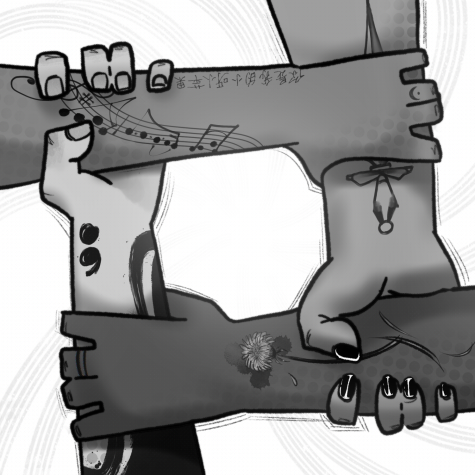Tattoos: To wear or to worry?
October 5, 2022
If you have been on campus for a while, you most likely have seen plenty of students and faculty with tattoos. While tattoos used to carry a negative stigma, especially in a professional work environment, some students and staff of Whitman College find this to no longer be the case.
Prentiss Hall and Douglas Hall Resident Director Quinn Sykora sees a lot of the stereotypes about tattoos relating to the belief that if you have a tattoo you are violent or a criminal.
“I think a lot of the stereotypes about people with tattoos are very negative. It really comes down to this idea that tattoos are for criminals … [that] they have that shady past and more assumptions that really belittle people with tattoos,” Sykora said. “I had to think a lot about getting my tattoos and where I got them because I knew that if I had them in too obvious of places it would close certain doors in my life.”
For many, getting a tattoo is not an act of impulse; it can be a sign of accomplishment. Professor of Biology Kate Jackson is an active herpetologist specializing in venomous snakes.
“I got my first tattoo to celebrate getting my Ph.D. That was a present from my sister,” Jackson said. “I feel pretty confident [that] I can tell anyone, ‘sure, get any tattoo you want to celebrate your Ph.D.’ or your degree of whatever sort you did; you can’t really go wrong then. You’re at a point where you’ve accomplished so much in life that you know yourself to some extent; you’re not going to do something absolutely crazy.”

For others, a tattoo is a memorial honoring loved ones and connections. The matter of ‘why’ for a tattoo is different for everyone. Senior biology major Alex Muller appreciates admiring others’ tattoos, as they are insight into their personality.
“Tattoos are super personal. There’s so many different styles and ways to position them on one’s body,” Muller said. “Every time I see tattooed people, I’m looking at it in terms of the art and [the] personality aspect.”
Of course, tattoos are a lifetime commitment. Sometimes they can be expensive to obtain, but they are always very costly to remove. The advice of others can be helpful in deciding whether or how you want one.
“I always force myself to sit with the idea of a tattoo for several months before even considering actually scheduling it, and I feel like that’s been helpful,” Muller said. “If you get bored of a design within just a few months, it probably wouldn’t be the best idea to tattoo it onto you permanently. I feel like it’s a good process of weeding out.”
Not only should you think about the design, but one should also consider the placement.
“People with tattoos gave me advice on where to get them. Aging is a real thing and our skin loses elasticity, so people with tattoos told me about places where they hold up the best over time and were really encouraging,” Sykora said. “Most people without tattoos didn’t really give me advice, just a lot of warning.”
In certain circumstances, those warnings may not be justified. Depending on the industry you work in, tattoos can be an accepted part of that culture. It all depends on the interpretations of the people there.
“They must be culturally dependent, right? What my tattoo means here in my office on campus [is different than] what my tattoo might be interpreted as in Pike Place Market, in Guinea or in Brazzaville, Congo,” Jackson said. “People will think I’m a witch or people will think I’m a cooler herpetologist than other herpetologists. It could be all sorts of things.”
For people curious about getting a tattoo, it can be best to listen to a community of people who have them already. Tattoo culture is on the rise, even if it still holds a lot of stereotypes amongst older generations.



